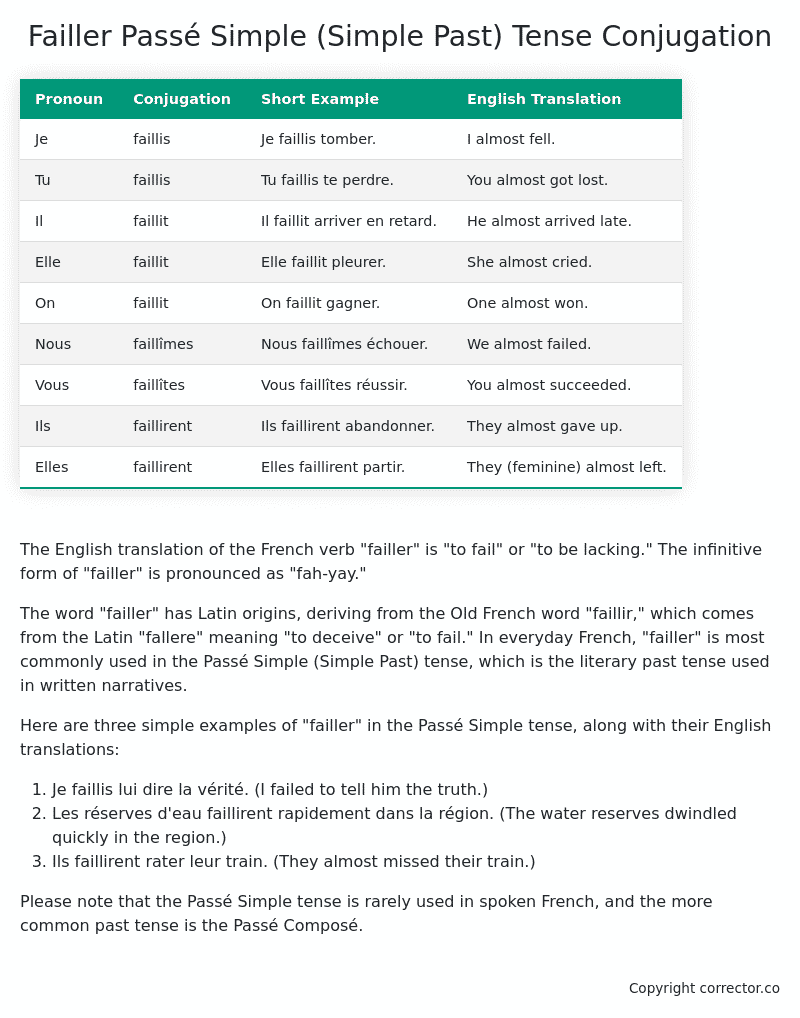Passé Simple (Simple Past) Tense Conjugation of the French Verb failler
Introduction to the verb failler
The English translation of the French verb “failler” is “to fail” or “to be lacking.” The infinitive form of “failler” is pronounced as “fah-yay.”
The word “failler” has Latin origins, deriving from the Old French word “faillir,” which comes from the Latin “fallere” meaning “to deceive” or “to fail.” In everyday French, “failler” is most commonly used in the Passé Simple (Simple Past) tense, which is the literary past tense used in written narratives.
Here are three simple examples of “failler” in the Passé Simple tense, along with their English translations:
- Je faillis lui dire la vérité. (I failed to tell him the truth.)
- Les réserves d’eau faillirent rapidement dans la région. (The water reserves dwindled quickly in the region.)
- Ils faillirent rater leur train. (They almost missed their train.)
Please note that the Passé Simple tense is rarely used in spoken French, and the more common past tense is the Passé Composé.
Table of the Passé Simple (Simple Past) Tense Conjugation of failler
| Pronoun | Conjugation | Short Example | English Translation |
|---|---|---|---|
| Je | faillis | Je faillis tomber. | I almost fell. |
| Tu | faillis | Tu faillis te perdre. | You almost got lost. |
| Il | faillit | Il faillit arriver en retard. | He almost arrived late. |
| Elle | faillit | Elle faillit pleurer. | She almost cried. |
| On | faillit | On faillit gagner. | One almost won. |
| Nous | faillîmes | Nous faillîmes échouer. | We almost failed. |
| Vous | faillîtes | Vous faillîtes réussir. | You almost succeeded. |
| Ils | faillirent | Ils faillirent abandonner. | They almost gave up. |
| Elles | faillirent | Elles faillirent partir. | They (feminine) almost left. |
Other Conjugations for Failler.
Le Present (Present Tense) Conjugation of the French Verb failler
Imparfait (Imperfect) Tense Conjugation of the French Verb failler
Passé Simple (Simple Past) Tense Conjugation of the French Verb failler (You’re reading it right now!)
Passé Composé (Present Perfect) Tense Conjugation of the French Verb failler
Futur Simple (Simple Future) Tense Conjugation of the French Verb failler
Futur Proche (Near Future) Tense Conjugation of the French Verb failler
Plus-que-parfait (Pluperfect) Tense Conjugation of the French Verb failler
Passé Antérieur (Past Anterior) Tense Conjugation of the French Verb failler
Futur Antérieur (Future Anterior) Tense Conjugation of the French Verb failler
Subjonctif Présent (Subjunctive Present) Tense Conjugation of the French Verb failler
Subjonctif Passé (Subjunctive Past) Tense Conjugation of the French Verb failler
Subjonctif Imparfait (Subjunctive Imperfect) Tense Conjugation of the French Verb failler
Subjonctif Plus-que-parfait (Subjunctive Pluperfect) Tense Conjugation of the French Verb failler
Conditionnel Présent (Conditional Present) Tense Conjugation of the French Verb failler
Conditionnel Passé (Conditional Past) Tense Conjugation of the French Verb failler
Conditionnel Passé II (Conditional Past II) Tense Conjugation of the French Verb failler
L’impératif Présent (Imperative Present) Tense Conjugation of the French Verb failler
L’impératif Passé (Imperative Past) Tense Conjugation of the French Verb failler
L’infinitif Présent (Infinitive Present) Tense Conjugation of the French Verb failler
L’infinitif Passé (Infinitive Past) Tense Conjugation of the French Verb failler
Le Participe Présent (Present Participle) Tense Conjugation of the French Verb failler
Le Participe Passé (Past Participle) Tense Conjugation of the French Verb failler
Struggling with French verbs or the language in general? Why not use our free French Grammar Checker – no registration required!
Get a FREE Download Study Sheet of this Conjugation 🔥
Simply right click the image below, click “save image” and get your free reference for the failler Passé Simple tense conjugation!

Failler – About the French Passé Simple (Simple Past) Tense
Formation
Usage
Narration
Historical Context
Interactions with other tenses
Passé Composé
Imparfait
Conditional and Subjunctive
Summary
I hope you enjoyed this article on the verb failler. Still in a learning mood? Check out another TOTALLY random French verb conjugation!


